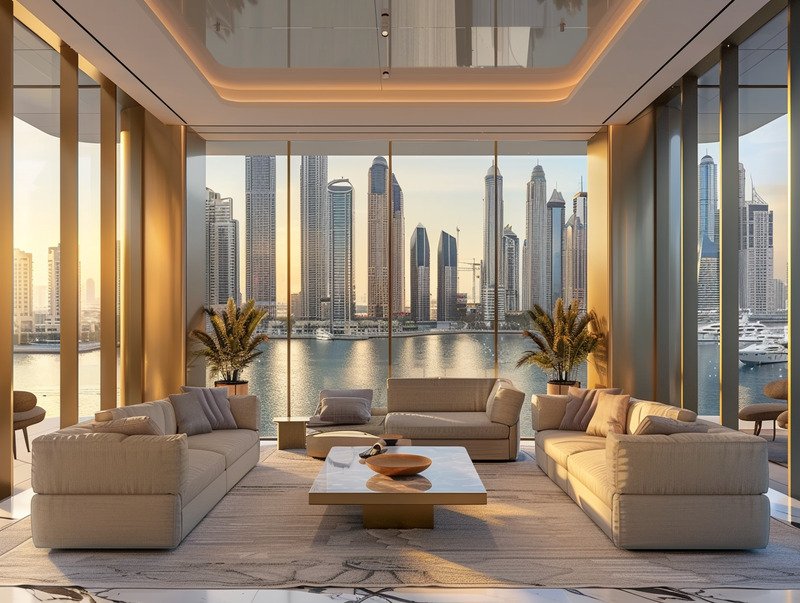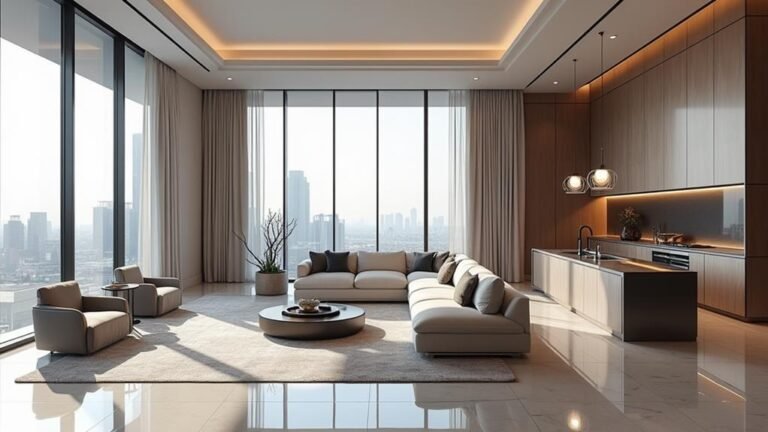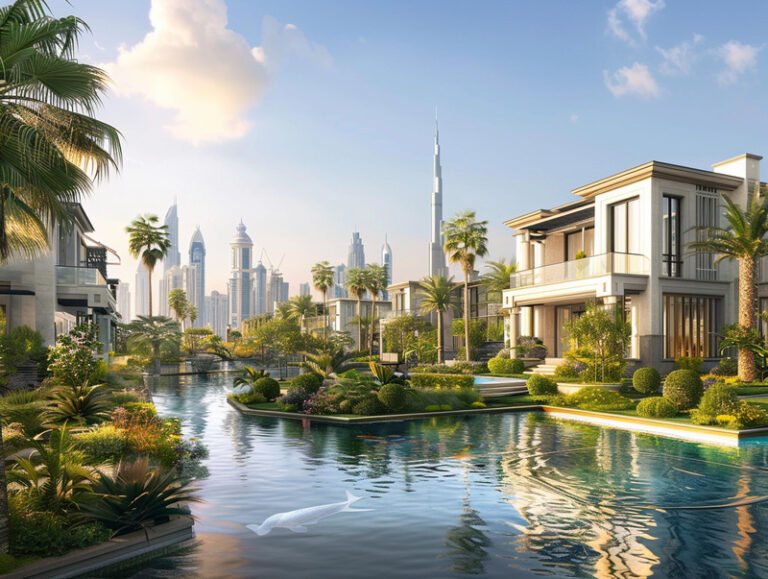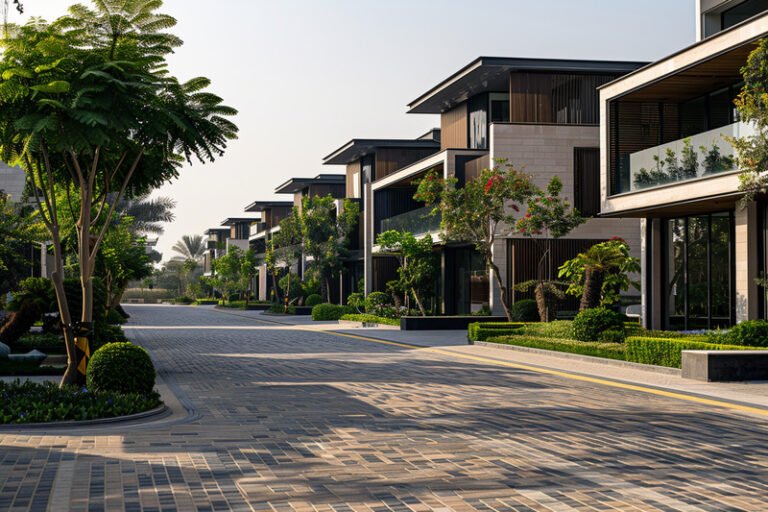Guide to Buying Under-Construction Properties in Dubai

To buy an under-construction property in Dubai, it is crucial to understand the legal framework, including RERA regulations, escrow accounts, and SPA agreements.
Assess the developer's reputation through past project successes, financial stability, and RERA registration.
Choose from various property types like apartments, villas, or commercial units. Analyze the location for proximity to amenities and future growth potential.
Review different payment plans like construction-linked and post-handover options. Monitor construction timelines and schedule quality inspections throughout the building process.
Let us help you find the perfect property. Contact us to get started.
Be aware of potential risks like project delays and developer instability. Investment returns can be significant with proper planning.
Continue for more insights on ensuring a successful purchase.
Legal Framework
When purchasing properties under construction in Dubai, you must grasp the legal framework to protect your investment. First, acquaint yourself with the Real Estate Regulatory Agency (RERA), which oversees real estate transactions and ensures developers comply with regulations. RERA mandates that developers must register all new projects, providing you with a sense of security.
Next, verify that the property is registered with the Dubai Land Department (DLD). The DLD maintains an extensive property database, which helps validate the legitimacy of the property and its developer. You should also be aware of the Escrow Account Law. This law requires developers to deposit buyers' payments into an escrow account, guaranteeing that funds are used solely for the project's construction.
Additionally, understand the terms of the Sales Purchase Agreement (SPA). The SPA outlines the payment schedule, construction milestones, and what occurs in the event of delays or non-completion. Make sure to review it thoroughly and, if possible, seek legal advice to avoid any hidden clauses.
Lastly, be informed about the Oqood system. This government service allows you to register off-plan properties, granting you legal ownership before the project's completion. By understanding these key legal aspects, you'll safeguard your investment in Dubai's dynamic real estate market.
Developer's Reputation
Evaluating the developer's reputation is vital to guaranteeing the reliability and quality of your under-construction property in Dubai. A reputable developer typically has a strong track record of successful projects, timely deliveries, and satisfied customers.
You should start by researching the developer's history, focusing on completed projects and feedback from previous buyers. Look for consistent positive reviews and testimonials that highlight quality construction, adherence to timelines, and effective customer service.
To further assess the developer's credibility, verify their registration with the Dubai Real Estate Regulatory Agency (RERA). RERA regulates the real estate market in Dubai and ensures that developers meet specific standards and legal requirements. Additionally, you should check for any legal disputes or complaints filed against the developer, as these can be red flags indicating potential issues.
Another critical aspect is the developer's financial stability. A financially sound developer is more likely to complete projects on time and maintain high construction standards. You can gather information on the developer's financial health through market reports, news articles, or by consulting real estate professionals.
Types of Properties
In Dubai's under-construction market, a diverse array of properties is available for purchase. The market includes residential, commercial, and mixed-use developments. Residential properties encompass apartments, villas, and townhouses, catering to different lifestyle needs and budgets. Apartments range from studios to multi-bedroom flats, while villas and townhouses offer more space and privacy, making them ideal for families.
Commercial properties in Dubai's under-construction market include office spaces, retail shops, and industrial units. These cater to businesses looking to establish or expand their presence in Dubai. Office spaces come in various sizes and layouts, suitable for both small startups and large corporations. Retail shops can be found in shopping malls and standalone locations, offering opportunities for different types of businesses.
Mixed-use developments in Dubai combine residential, commercial, and sometimes hospitality components in one project. These properties aim to create integrated communities where residents can live, work, and play. They often feature amenities like gyms, pools, and retail outlets, enhancing the overall lifestyle experience.
Location Analysis
Choosing the right location for your under-construction property in Dubai can greatly impact your investment's value and your lifestyle. Dubai offers diverse neighborhoods, each with unique benefits.
Begin by identifying your priorities: proximity to work, schools, public transport, or recreational areas. For instance, areas like Downtown Dubai and Business Bay are ideal for those who prefer a bustling environment with easy access to financial districts.
Consider the future development plans of the area. Locations with upcoming infrastructure projects, such as new metro lines or shopping centers, can significantly appreciate in value. Check Dubai's Urban Master Plan to understand these future developments.
Evaluate the neighborhood's current amenities. Areas like Dubai Marina and Jumeirah Beach Residence offer luxury living with waterfront views, while communities like Arabian Ranches and Mudon provide family-friendly environments with parks and schools.
Safety and security are also vital. Research crime rates and community reviews to ensure a secure living environment. Accessibility to major highways, airports, and hospitals should also be on your checklist.
Lastly, consider the long-term potential. Some areas may be more expensive initially but could offer a higher return on investment due to their strategic location and planned developments.
Payment Plans
After selecting the perfect location, understanding the various payment plans available for under-construction properties in Dubai is important for effective financial planning. Payment plans in Dubai typically offer flexibility to suit different financial situations, and it's vital to familiarize yourself with these options.
One common payment plan is the construction-linked plan, where you make payments in stages as the construction progresses. This plan minimizes risk, guaranteeing your payments correspond to the development's milestones.
Another option is the post-handover payment plan, allowing you to pay a portion of the property value after taking possession. This plan can ease financial strain, providing more time to manage your finances.
Some developers offer interest-free installment plans, spreading payments over several years without additional costs. These plans can be appealing if you prefer to avoid interest charges.
Additionally, a balloon payment plan may be available, where smaller payments are made initially, with a large final payment due upon completion. This option can be helpful if you expect a significant influx of funds in the future.
Review each payment plan carefully, considering your financial stability and long-term goals. By doing so, you'll guarantee that your investment in an under-construction property aligns with your financial capabilities.
Financing Options
When purchasing an under-construction property in Dubai, understanding the available financing options is necessary for making informed decisions. You'll find several ways to fund your purchase, each with its own requirements and benefits.
One common method is obtaining a mortgage from a bank. Many banks in Dubai offer specialized mortgage products for under-construction properties, providing up to 80% financing. However, you'll need to meet specific eligibility criteria, including a steady income and a good credit score.
Another option is developer financing. Some developers offer in-house financing plans, allowing you to pay in installments over the construction period. These plans often come with flexible payment schedules and lower interest rates compared to traditional mortgages. However, it's important to read the fine print and understand all terms and conditions.
You might also consider a personal loan or tapping into your savings. Personal loans usually have higher interest rates but offer quicker approval processes and fewer restrictions. Using your savings can help you avoid interest payments, but it's crucial to ensure you're not depleting your emergency fund.
Construction Timelines
Understanding your financing options is just one part of the equation; knowing the construction timelines is equally important for planning your purchase. When you're buying an under-construction property in Dubai, you need to be aware of the project's expected completion date. Developers usually provide an estimated timeline, but it's crucial to acknowledge that delays can occur due to various factors, such as regulatory approvals, supply chain issues, or unforeseen events.
Monitoring the construction milestones is vital. These milestones typically include the project's groundbreaking, structural completion, and finishing stages. By keeping track of these stages, you can better anticipate when your property will be ready for occupancy. Regular updates from the developer can help you stay informed about the progress and any potential delays.
Another key aspect is the handover date, which is when the developer officially transfers the property to you. This date is significant because it impacts your financial planning, especially if you need to arrange for additional funds or temporary housing. Always review the contract terms to understand the penalties or compensation you might be entitled to if there are significant delays.
Staying informed about the construction timelines ensures a smoother shift into your new home and helps you manage your expectations effectively.
Quality Inspections
Securing the quality of your under-construction property in Dubai involves conducting thorough examinations at various stages of the building process. First, you'll want to start with a pre-foundation inspection. This verifies that the ground and foundation work meet all necessary standards before any construction begins.
Next, schedule regular examinations during the structural phase. These checks, often conducted by certified professionals, confirm that the building's skeleton is being erected correctly, adhering to the approved design and safety codes.
As construction progresses, it's important to monitor the installation of essential systems like electrical wiring, plumbing, and HVAC. Conducting examinations at this stage ensures that these systems are installed correctly and function as intended.
Additionally, the finishing phase, which includes walls, flooring, and fixtures, also requires detailed inspection to guarantee that all elements meet your quality expectations.
Don't forget to perform a final walk-through once construction is complete. This thorough inspection helps identify any remaining issues that need to be addressed before you take possession of the property.
Potential Risks
Buying an under-construction property in Dubai comes with several potential risks that buyers should consider carefully. One of the primary risks is project delays. Developers may face unforeseen challenges, such as regulatory changes, labor shortages, or supply chain disruptions, leading to extended timelines. When projects are delayed, you might also incur additional costs, such as rental expenses if you were planning to move in by a certain date.
Another significant risk is financial instability of the developer. If the developer faces financial difficulties, the project might be delayed indefinitely or, in a worst-case scenario, abandoned altogether. It's important to research the developer's track record and financial health before committing to a purchase.
Quality issues can also arise in under-construction properties. Despite inspections, some defects mightn't become apparent until after you take possession. These could range from minor cosmetic issues to major structural problems, impacting your investment and living experience.
Investment Returns
Despite the risks, under-construction properties in Dubai can offer attractive investment returns when approached with due diligence. One of the primary advantages is the potential for significant capital appreciation. By investing early, you can purchase properties at lower prices compared to fully developed units. As construction progresses and the property nears completion, its value typically increases, providing substantial returns on your initial investment.
Additionally, developers in Dubai often offer flexible payment plans for under-construction properties. These plans allow you to spread out your financial commitment over the construction period, making it easier to manage your cash flow. This financial flexibility can be particularly beneficial if you're looking to diversify your investment portfolio without overextending your resources.
Rental yields in Dubai can also be quite lucrative. Once the property is completed and the market demand remains strong, you could achieve high rental returns. The city's robust infrastructure, favorable tax policies, and growing expatriate population contribute to a thriving rental market.
Lastly, investing in under-construction properties often gives you access to modern amenities and cutting-edge designs. These features not only enhance the property's market appeal but can also command higher rental rates, further boosting your investment returns.
Conclusion
To sum up, buying an under-construction property in Dubai requires careful consideration of the legal framework, the developer's reputation, and the type of property.
You should also conduct a thorough location analysis and review the available payment plans. Keep an eye on construction timelines and perform quality inspections.
Be aware of potential risks and consider the investment returns. With diligent research and planning, you can make an informed decision that aligns with your financial goals.
Let us help you find the perfect property. Contact us to get started.






